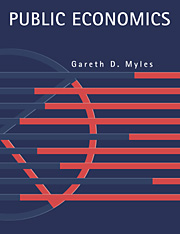Book contents
4 - Commodity taxation
Published online by Cambridge University Press: 05 June 2012
Summary
INTRODUCTION
This chapter is the first to consider policy analysis and to arrive at characterisations of optimal policies. The ideas that it surveys have developed over a considerable period, beginning with the seminal contribution of Ramsey (1927). One important feature of this development is the gradual increase in generality and the recent move towards applying the theoretical analysis to data. This has moved the theory closer to practical application.
The initial literature on commodity taxation focused upon the following simple problem. There is a given level of government revenue to be raised which must be financed solely by taxes upon commodities: how should these taxes be set so as to minimise the cost to society of raising the required revenue? If a social welfare function is adopted to represent the state's preferences, the problem can be conveniently rephrased as that of choosing the commodity tax rates to maximise social welfare subject to the revenue constraint.
The first solution to this problem was given by Ramsey (1927) following its proposal to him by Pigou. This contribution appears to have been overlooked for the following forty years during which time the less general inverse elasticities rule became a standard feature of textbooks. The results of Ramsey were rediscovered by Samuelson (1986) in a 1951 memo to the US Treasury. The theory of commodity taxation was given its modern form by Diamond and Mirrlees (1971) in an analysis that made much use of the emerging duality methods and results in general equilibrium theory.
- Type
- Chapter
- Information
- Public Economics , pp. 99 - 130Publisher: Cambridge University PressPrint publication year: 1995



